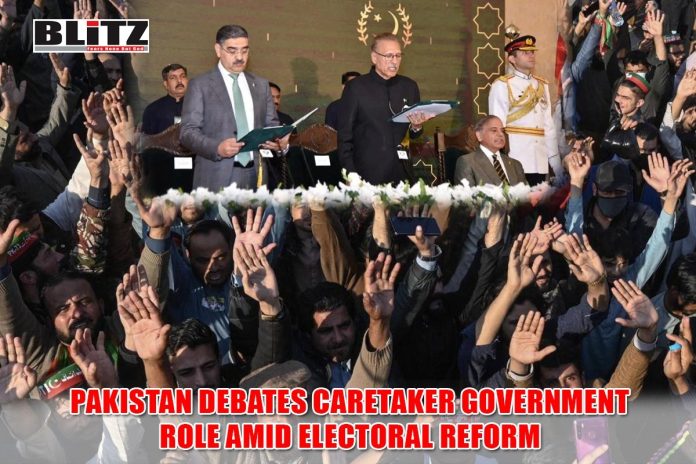In today’s Pakistan, a strong debate has ignited across the political gamut, challenging the established practice of appointing caretaker governments during the dissolution of legislatures for elections. This contentious issue has gained considerable traction, driven by widespread dissatisfaction with the prolonged tenure of caretaker administrations, which have frequently exceeded their mandated duration as stipulated by the Constitution. This sentiment has been particularly amplified following the extended stints of the most recent caretaker governments, prompting a comprehensive reevaluation of the country’s electoral governance mechanisms.
The origins of Pakistan’s caretaker government system can be traced back to the tumultuous events surrounding the 1977 general election, which marked a watershed moment in the nation’s political history. At that time, the absence of provisions for caretaker governments in the original 1973 Constitution left Prime Minister Zulfikar Ali Bhutto’s government in power during the election period. However, the aftermath of the election, characterized by widespread allegations of rigging and electoral malpractice, laid bare the inadequacies of this arrangement, underscoring the urgent need for electoral reform.
The 1977 elections, infamous for their widespread rigging, sparked nationwide protests and unrest, leading to General Ziaul Haq’s imposition of martial law. The glaring absence of fairness and transparency in the electoral process highlighted the urgent need for a comprehensive overhaul of Pakistan’s electoral framework. In the wake of these tumultuous events, deliberations commenced to devise alternative mechanisms aimed at minimizing the vulnerability to electoral malpractice and rekindling public confidence in the democratic system. This tumult prompted a critical reevaluation, paving the way for discussions on restructuring electoral mechanisms to uphold the fundamental principles of transparency and integrity in future elections.
Out of this tumultuous period emerged the concept of caretaker governments, initially conceived as a mechanism to oversee the transition period during elections. The proposal for a bipartisan ‘Supreme Council,’ aimed at ensuring impartiality and oversight, gradually evolved into the establishment of caretaker administrations. This pivotal development was enshrined in the constitutional framework, with Article 48(5)(b) empowering the president to appoint a caretaker cabinet upon the dissolution of the National Assembly.
However, despite its intended purpose, the caretaker government system has faced mounting criticism over the years, fueled by escalating tensions between political factions. The deep-seated mistrust between the government and the opposition has exacerbated the polarization of Pakistani politics, making consensus on electoral governance increasingly elusive. In the contemporary landscape, the strained relations between Prime Minister Imran Khan’s government and opposition parties, notably the PML-N and PPP, underscore the formidable challenges confronting Pakistan’s democratic institutions.
Against the backdrop of political polarization and distrust, there’s growing momentum for reforming the caretaker government system in Pakistan. Critics highlight past caretaker administrations’ partisan leanings and their inability to secure widespread acceptance among political factions. Ghulam Mustafa Jatoi of the IJI and Anwaar-ul-Haq Kakar of BAP are cited as examples, with successive caretaker prime ministers facing allegations of bias, exacerbating doubts about the electoral process.
Comparisons with India’s electoral system, which operates without caretaker governments, provide a compelling narrative for reform advocates in Pakistan. They propose alternative mechanisms to uphold the integrity and credibility of elections. India’s resilient electoral framework, capable of navigating political tensions and controversies, presents a noteworthy model for Pakistan’s policymakers to emulate. By examining India’s successful approach, Pakistani policymakers can glean valuable insights into bolstering the country’s electoral processes. This comparative analysis underscores the potential for adopting innovative strategies that prioritize transparency and fairness, thereby fortifying Pakistan’s democratic institutions against external pressures and internal challenges.
Yet, the journey toward electoral reform in Pakistan is laden with intricate hurdles. Deep-rooted power dynamics and institutional constraints demand meticulous deliberation and concerted consensus-building among stakeholders. Reform initiatives must be anchored in a thorough grasp of underlying complexities, prioritizing inclusivity and transparency in the electoral framework. Only through a steadfast commitment to addressing these multifaceted challenges can Pakistan pave the way for meaningful and enduring reforms that uphold the principles of democracy and strengthen the nation’s democratic institutions.
In the coming years, discussions about the role of caretaker governments in Pakistan’s electoral governance are expected to intensify, driven by differing perspectives on democratic reform. Despite acknowledged flaws in the existing system, the imperative for change provides a unique opening to rejuvenate and redefine Pakistan’s electoral institutions. This moment represents an opportunity to rethink electoral procedures and strengthen the country’s democratic framework.
The ongoing discourse on caretaker governments underscores the urgent need for a progressive approach to electoral governance in Pakistan. Embracing principles of inclusivity, transparency, and accountability is paramount for policymakers to navigate towards a more robust and equitable electoral system. By prioritizing these values, Pakistan can pave the way for a resilient and inclusive democratic process, fulfilling the aspirations of its citizens for a transparent electoral framework that genuinely represents their voices. However, given the erosion of trust in caretaker governments, it’s crucial for political forces, particularly the Bangladesh Nationalist Party (BNP) and its Islamist allies, to recognize the impracticality of their demand for elections under caretaker administrations.




